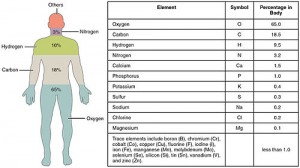Here’s a thought experiment for our materialist friends.
Suppose you have a table, and on that table you place three cylinders, one each of oxygen, hydrogen and nitrogen. Beside these cylinders you place a lump of carbon, a lump of calcium, and a jar of phosphorus. These chemicals make up over 98% of the human body by mass. Suppose further that you place on the table containers of each of the trace chemicals found in the human body so that at the end you have on your table all of the chemicals found in the human body in the same amount by mass and in the same proportion as those chemicals occur in the human body.
Now ask yourself some questions:
1. Do you owe any moral duty to any of the individual chemicals? I presume you will say the answer is “no.”
2. Does your answer change if instead of the individual chemicals, you consider all of them setting there on your table together? I presume the answer is still “no.”
3. Now suppose you mix all of the chemicals together? Does your answer change? I presume the answer is still “no.”
I presume by your answer to these three questions that you believe that there is nothing special about the chemicals in the human body – whether considered in isolation or in combination – that causes you to owe any moral duty to those chemicals. On materialist premises, a human being is nothing more than a somewhat sophisticated mixture of its constituent chemicals. I presume you will say that you owe moral duties to other human beings. So my final question is this:
4. What is it about the mixture of chemicals we call “human being” that makes it the repository of moral rights (i.e., the converse of the moral duty you owe it)?
Chart courtesy of Wikipedia.
